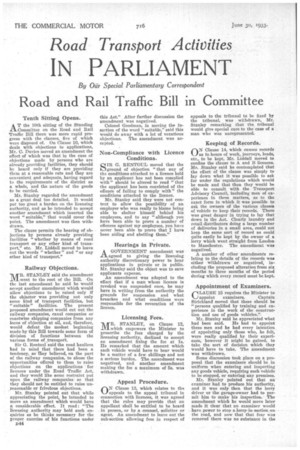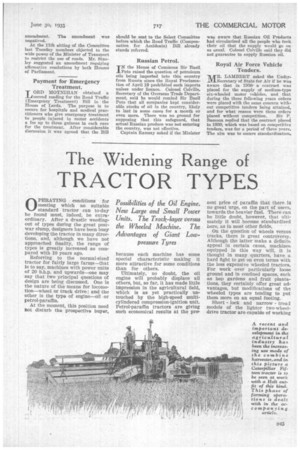Road Transport Activities
Page 94

Page 95

If you've noticed an error in this article please click here to report it so we can fix it.
IN PARLIAMENT
By Our Special Parliamentary Correspondent
Road and Rail Traffic Bill in Committee
Tenth Sitting Opens.
AT the 10th sitting of the Standing Committee on the Road and Rail Traffic Bill there was more rapid progress with the clauses, five of which -were disposed of. On Clause 10, which deals with objections to applications, Mr. C. Davies moved an amendment the effect of which was that in the case of objections made by persons who are already providing facilities, they should be heard only if they are providing them at a reasonable rate and they are coil venient and adequate, having regard to the requirements of the district as a whole, and the nature of the goods to be carried.
Mr. Stanley regarded the amendment as a great deal too detailed. It would put too great a burden on the licensing authority, and as he intended to accept another amendment which inserted the word "suitable," that would cover the point. The amendment was then withdrawn.
The clause permits the hearing of objections by persons already providing facilities "whether by means of road transport or any other kind of transport," etc. Mr. Liddell moved to leave out the words " whether " and "or any other kind of transport."
Railway Objections.
-Tur-R. STANLEY said the amendment Itt.went to the root of the Bill. On the last amendment he said he would accept another amendment which would allow objections to be raised only if the objector was providing not only some kind of transport facilities, but "suitable" facilities. The present proposed amendment would cut out the railway companies, canal companies or coastwise shipping companies from any locus of objection at all, and, therefore, would defeat the modest beginning made by this Bill towards some form of division of functions between the various forms of ,transpoft.
Sir G. Rentoul said the road hauliers bad in mind that there had been a tendency, so They believed, on the part of the railway companies, to abuse the opportunities offered to them to raise objections on the applications ' for licences under the Road Traffic Act, and they would like some restraint put upon the railway companies 80 that they should not be entitled to raise unreasonable or frivolous objections.
Mr. Stanley pointed out that while appreciating the point, he intended to move an amendment which would have a considerable effect. It read : "The licensing authority may bold such enquiries as he thinks necessary for the proper exercise of his functions under this Act." After further discussion the amendment was negatived.
Colonel Goodman, in moving the insertion of the word "suitable," said this would do away with a lot of vexatious objections. The amendment was accepted.
Non-Compliance with Licence Conditions.
4_1 TR G. RENTOUL moved that the 13ground of objection "that any of the conditions attached to a licence held by an applicant has not been complied with" should be altered to read "that the applicant has been convicted of the offence of failing to comply with" the conditions attached to the licence.
Mr. Stanley said they were not content to allow the possibility of an employer who was really to blame being able to shelter himself behind his employees, and to say "although you have been able to prove a number of oflences against my employees, you have never been able to prove that I have been aiding and abetting them."
Hearings in Private.
A GOVERNMENT amendment was 13...agreed to giving the licensing authority discretionary power to hear applications in private or in public. Mr. Stanley said the object was to save applicants expense.
An amendment was adopted to the effect that if a man whose licence is revoked was suspended once, he may have in writing from the authority the grounds for suspension and what breaches and what conditions were responsible for the revocation of the licence.
Licensing Fees.
iurR. STANLEY, on Clause 12, ..a.Lwhich empowers the Minister to proscribe the fees charged by the licensing authority, declined to accept an amendment fixing the fee at is. He remarked that the amount which each vehicle would have to bear would be a matter of a few, shillings and not a serious burden. The .amendment was negatived, and another amendment making the fee a maximum of 5s. was withdrawn.
Appeal Procedure.
OClause 13, which relates to the appeals to the appeal tribunal in connection with licences, it was agreed that the rules may provide that an appellant shall be entitled to be heard in person, or by a counsel, solicitor or agent. An amendment to leave out the sub-section allowing fees in respect of appeals to the tribunal to be fixed by the tribunal, was withdrawn, Mr. Stanley remarking that the tribunal would give special care to the ease of a man who was unrepresented.
Keeping of Records.
rIN Clause 14, which causes records
as to hours of work, journeys, loads, etc. to be kept, Mr. Liddell moved to confine the clause to A and B licences. Mr. Stanley said he contemplated that the effect of the clause was simply to lay down what it was possible to ask for under the regulations which would be made and that then they would be able to consult with the Transport Advisory Council, including men of experience in these matters, as to the exact form in which it was possible to ask the owners of the various classes of vehicle to keep their records. There was great danger in trying to lay that down in the Act. Clearly laundry and retail distributors doing a large number of deliveries in a small area, could not keep the same sort of record as could quite easily be kept by the owner of a lorry which went straight from London to Manchester. The amendment was negatived.
A number of other amendments relating to the details of the records was either withdrawn or negatived, including the proposed alteration from six months to three months of the period during which every record must be kept.
Appointment of Examiners.
CLAUSE 15 requires the Minister to appoint examiners. Captain Strickland moved that these should be "persons qualified by training and experience in the work of the construction and use of goods vehicles."
Mr. Stanley said he appreciated what
had been said. He had to appoint these men and he had every intention of appointing only those who, he felt, were really qualified by their experience, however it might be gained, to take the sort of decision which they would have to take. The amendment was withdrawn.
Some discussion took place on a proposal that the examiners should be in uniform when entering and inspecting any goods vehicle, requiring such vehicle to be stopped, or entering any premises.
Mr. Stanley pointed out that an examiner had to produce his authority, and it was only then that the lorry driver or the garage-owner had to permit him to make his inspection. The amendment which he would move later made it clear that no examiner would have power to stop a lorry -in motion on the road, and now that that fear was removed there was no substance in the amendment. Tha amendment was negatived.
At the llth sitting of the Committee last Tuesday members objected to the wide power of the Minister of Transport to restrict the use of roads. Mr. Stanley suggested an amendment requiring affirmative resolutions by both Houses of Parliament.
Payment for Emergency Treatment.
T ORD MOYNIHAN obtained a _LI second reading for the Road Traffic (Emergency Treatment) Bill in the House of Lords. The purpose is to secure for hospitals and medical practitioners who give emergency treatment to people injured in motor accidents a fee up to three guineas in each case for the treatment. After considerable discussion it was agreed that the Bill
sbould he sent to the Select Committee before which the Road Traffic (Compensation for Accidents) Bill already stands referred.
Russian Petrol.
IN the House of Commons Sir Basil Pete raised the question of petroleum oils being imparted into this country from Russia since the Royal Proclamation of April 19 prohibited such imports unless under licence. Colonel Colville, Secretary of the Overseas Trade Department, said he would remind Sir Basil Pete that all companies kept considerable stocks of oil in the country, likely to last in some cases for a month or even more. There was no ground for supposing that this safeguard, that actual Russian produce was not entering the country, was not effective.
Captain Ramsay asked if the Minister was aware that Russian Oil Products had circularized all the people who took their oil that the supply would go on as usual. Colonel Colville said they did not guarantee to supply Russian oil.
Royal Air Force Vehicle Tenders.
iur-R. LAMBERT asked the UnderIVISecretary of State for Air if he was aware that in 1930, a contract was placed for the supply of medium-type six-wheeled motor vehicles, and that during the three following years orders were placed with the same concern with-. out competitive tenders being attained, and for what reason were these orders
placed without competition. Sir P. Sassoon replied that the contract placed in 1930, which was based on competitive tenders, was for a period of three years. The aim was to secure standardization.




















































































































































